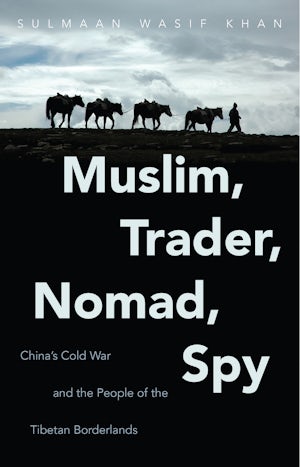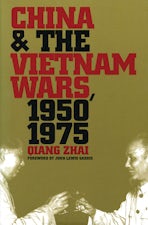Muslim, Trader, Nomad, Spy
China's Cold War and the People of the Tibetan Borderlands
By Sulmaan Wasif Khan
216 pp., 5.5 x 8.5, 6 maps, notes, bibl., index
Not for sale in South Asia
-
Paperback ISBN: 978-1-4696-3075-5
Published: March 2016 -
E-book EPUB ISBN: 978-1-4696-2111-1
Published: March 2015 -
E-book PDF ISBN: 979-8-8908-4707-2
Published: March 2015
New Cold War History
Buy this Book
- Paperback $32.50
- E-Book $19.99
For Professors:
Free E-Exam Copies
What Chinese policymakers confronted in Tibet, Khan argues, was not a "third world" but a "fourth world" problem: Beijing was dealing with peoples whose ways were defined by statelessness. As it sought to tighten control over the restive borderlands, Mao's China moved from a lighter hand to a harder, heavier imperial structure. That change triggered long-lasting shifts in Chinese foreign policy. Moving from capital cities to far-flung mountain villages, from top diplomats to nomads crossing disputed boundaries in search of pasture, this book shows Cold War China as it has never been seen before and reveals the deep influence of the Tibetan crisis on the political fabric of present-day China.
About the Author
Sulmaan Wasif Khan is assistant professor of international history and Chinese foreign relations at the Fletcher School, Tufts University.
For more information about Sulmaan Wasif Khan, visit
the
Author
Page.
Reviews
"A good read, full of fascinating tales and an important contribution to our knowledge of this region and a corrective to the state-centric histories to date."--H-Net Reviews
“[A] colorful and insightful case study.”--Choice
“An interesting and thought-provoking book that makes an important contribution to the field.”--Asian Affairs
"Scholars have long championed a 'new international history,' seeking work that not only studies high politics but also represents the bottom-up, cultural, and social experience of everyday people. Emerging here is the kind of pathbreaking book that so many of us have been striving to produce."--Chen Jian, author of Mao’s China and the Cold War
“This book sheds light on an untold aspect of the Tibetan story. Muslim, Trader, Nomad, Spy is a welcome contribution to the debates in the field, providing a new research direction that is bound to intrigue future scholars."--Xiaoyuan Liu, University of Virginia




